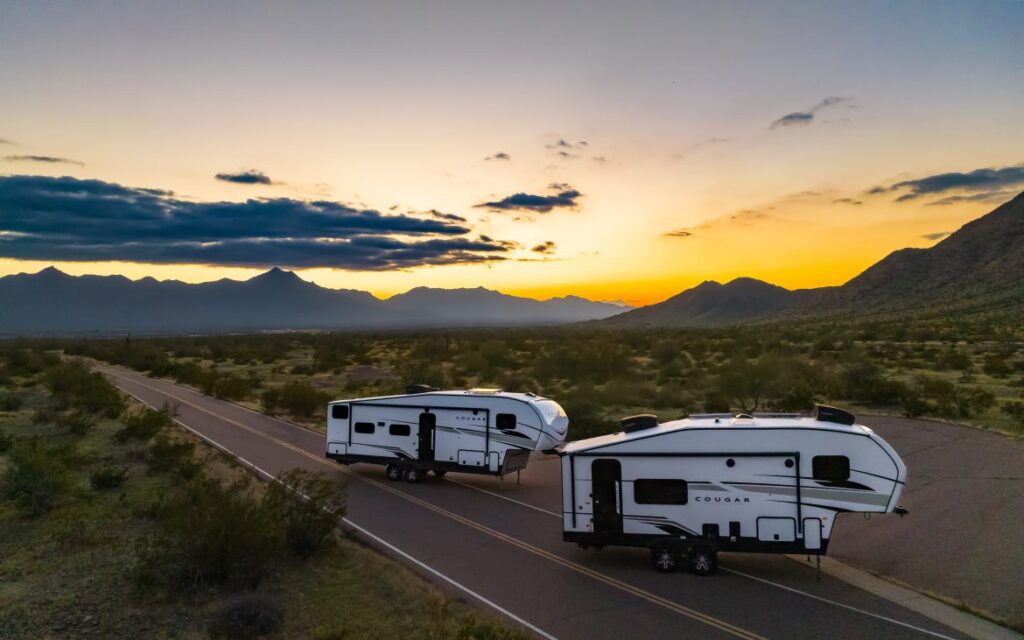Avoid These 6 Mistakes While RVing During the Winter Months
4 min read
During the colder months, it’s hard to resist the allure of snowy landscapes. However, venturing into a winter wonderland requires careful planning and consideration to ensure a safe and enjoyable experience. RVing in the cold comes with its own set of challenges, and preparation is crucial for a smooth journey. In this guide, RV Trader is exploring the top six mistakes you should avoid while RVing during the winter. Hopefully, these tips will help you make the most of your cold-weather adventures.
Neglecting Insulation, Heating Systems, and Propane Needs
One of the most common mistakes RV travelers make during the winter is underestimating the importance of proper insulation and heating systems. Insufficient insulation can lead to heat loss, which makes it challenging to maintain a comfortable temperature inside your RV. Before hitting the road, make sure your RV’s windows and doors are well-insulated. Additionally, check and service your heating system to guarantee it’s functioning well for the colder months.
Something else to keep in mind is that temperature differences between the inside and outside of your RV can cause issues with condensation. Ignoring condensation can lead to mold, mildew, and damage to your RV’s interior. Invest in moisture-absorbing products, use proper ventilation, and consider adding thermal curtains to minimize condensation.
Lastly, make sure you have enough propane to power your heating system, stove, and water heater before you embark on your trip. Monitor your propane levels regularly and carry extra cylinders, especially if you plan to go boondocking in remote areas. Propane consumption tends to increase in colder temperatures, so having a surplus is a cautious strategy for a stress-free journey.
Inadequate Winterization
Winterizing your travel trailer or any RV is an essential step before braving slick, icy roads and entering sub-zero temperatures. Failing to winterize properly can result in frozen pipes, burst water lines, and extensive damage to your vehicle. Invest time in thorough winterization, including draining the water system, adding antifreeze, and insulating exposed pipes. Don’t forget to protect external components, like the water heater and sewage system.
Overlooking Tire and Battery Maintenance
Proper maintenance is essential for safe winter RVing, especially when it comes to your tires and battery. Cold weather can lead to decreased tire pressure, which increases the risk of blowouts. Regularly check tire pressure and inflate them to the manufacturer’s recommended levels. Additionally, consider investing in winter tires for better traction on snowy and icy roads. As far as your batteries go, inspect them regularly to make sure they’re charged and functioning. Cold temperatures can affect battery performance, so this is a crucial step before you hit the road. Consider investing in a battery tender to keep them charged during periods of inactivity.
Insufficient Route Planning
Navigating winter roads requires careful route planning. Failing to account for weather conditions, road closures, and potential hazards can turn your dream trip into a nightmare. Stay updated on weather forecasts, road conditions, and closures along your route. Plan alternate routes in case of unexpected obstacles, and always prioritize safety over speed. Taking these precautions will help you enjoy the winter scenery without compromising your safety.
Overlooking Weight Distribution
Proper weight distribution is imperative for maintaining control of your fifth wheel or any RV, especially on slippery roads. Before heading out, make sure that your RV’s weight is evenly distributed, and pay attention to the placement of heavy items. This enhances safety and stability and contributes to better fuel efficiency and overall a smoother driving experience.
Forgetting Emergency Preparedness
Make sure you’re ready for unexpected challenges, like sudden storms or unforeseen mechanical issues. If you aren’t, a minor inconvenience could quickly turn into a major crisis. Pack an emergency kit with essentials like blankets, non-perishable food, water bottles, a first aid kit, and basic tools. Familiarize yourself with emergency procedures and contact information for roadside assistance. In addition, equip your RV with a reliable generator so you have a continuous power supply, in case you encounter heavy snowfall in a remote location. These measures can help you stay calm in unexpected situations.
RVing during the winter is a unique experience for those who are willing to embrace the cold. However, adequate preparation is key. From proper insulation and tire maintenance to thorough winterization and emergency preparedness, there are plenty of things you can do to set yourself up for success. Address these key concerns before you begin your winter trip, and get ready for a memorable and stress-free experience.
If you’re looking to buy a new or used RV for your winter travels, check out our nationwide inventory on RVTrader.com.
The post Avoid These 6 Mistakes While RVing During the Winter Months appeared first on Unique RV Camping with Harvest Hosts.



